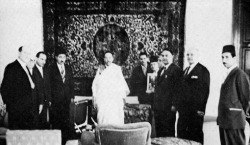Libya: Struggle For Independence
Becoming Their Own
By: Aly Sklare

Imagine your world being taken over and having to fight for what is rightfully yours. This is exactly what people in Libya had to deal with when their homes were taken over by foreigners. The two options for Libya, or a country that has been taken over, is either to just let it be or fight for independence.
For most of Libya’s history they have been under different degrees of foreign control. During the fight over control of African Countries from Europeans, Italy was in the quest for Libya. In 1911 they declared war on the Ottoman Turks, who were occupying Libya at the time. The Turks surrendered a year later. Libya’s people never favored European colonization. Members of the Sansui, a Sufi (a member of a Muslim movement group) religious order, attempted to resist Italian rule (Middleton, 14).
In 1943, Great Britain and France gained control of Libya and divide it into three regions. Britain got Tripolitania and Cyrenaica and Frezzan went under French control. But back again in 1947 was Italy to reestablish control of Libya. In 1949 a sudden change came when Cyrenaica becomes an independent region, with the help of Emir Sayyis Idris Sanussiy as leader. It is now apart of Libya but then; it was just breaking away from Italian control, not becoming an independent state. Later that year the United Nations granted independence to a united Libya, before January 1, 1952 (Looklex Liby, 1). This was very important; because this was the first time this had ever happened to an African Country. A council of leaders from Libya’s three regions met and declared the new country to be a united kingdom headed by Muhammad Idris, who was a hero of the Sanusi resistance against the Italians, he became known as King Idris I (Middleton, 14). Libya declared its independence on December 24, 1951! It was the first country to achieve independence through the United Nations and one of the first former European possessions in Africa to gain independence (Under Secretary for Public Diplomacy and Public Affairs, 1).
Looking back at it the most important event that really made an impact on helping Libya becoming an independent state was when Cyrenaica became an independent region. This brought attention to the United Nations and made them think this is not right with African Countries being taken over from. Also, King Idris I was a major leader of the independence movement as mentioned before. He was the one who led resistance against Italy between the two world wars, and later he was the one who represented Libya at the United Nations negotiations (stategov, 1).
Libya has progressed since Italian occupation. Now in Libya, Arabic is the dominant language, but English, French, and Italian are spoken in major cities (Middleton, 16). The current relationship between Italy and Libya is that they both have mutual respect for the other. The two countries are helping each other out. For example, they made promises to each other to search for deportees, compensation for mine victims, Italy pledged to return are facts, and Libya is allowing expelled Italian to return (BBC news, 1-2).
Bibliography
"Italy-Libya statement." BBC NEWs 10 July 1998. 3 May 2009 <http://news.bbc.co.uk/2/hi/130378.stm>. This source really helped me find how Libya and Italy were right now with their relationship.
"Libyana-History." Looklex Libya. 3 May 2009 <http://looklex.com/libya/index.htm>. This was a timeline that was really helpful with finding the exact dates and helped me get a better understanding of the order in which everything happened.
Middleton, John. "Libya." Africa: An Encyclopedia for Students. 3rd ed. 4 vols. MacMillan Reference USA, 2002. 13-16. This source really helped me with finding brief information on the basics of what happened with Libya finding their independence. This book was really straightforward and easy to use.
